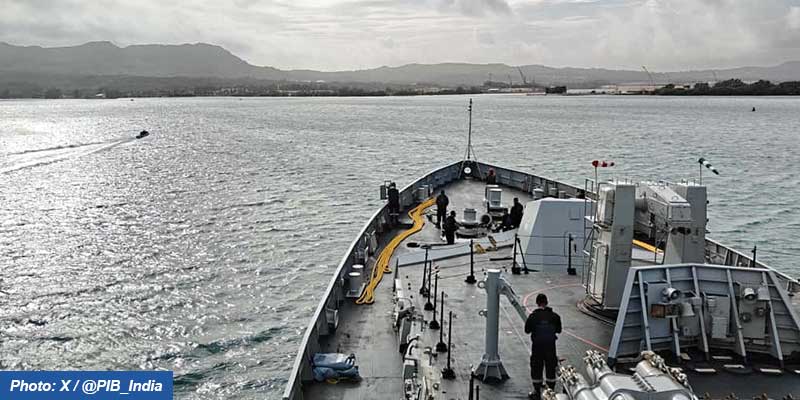- India
- Nov 10
- Sreesha V.M
INS Sahyadri to participate in ‘Malabar’ exercise
• The navies of India, the US, Australia and Japan will kick-start the annual Malabar naval exercise in the Northern Pacific on November 10.
• The nine-day exercise is taking place in the Northern Pacific’s Guam.
• The Indian Navy has deployed its guided missile frigate INS Sahyadri for the mega exercise being hosted by the US.
• Indigenously designed and constructed INS Sahyadri is a guided missile stealth frigate.
• In 2024, India hosted the exercise in Visakhapatnam.
History of Malabar exercise
• Malabar is an annual maritime exercise that enhances planning, training and employment of advanced warfare tactics between the Indian Navy (IN), US Navy, Japan Maritime Self-Defense Force (JMSDF) and Royal Australian Navy (RAN) which demonstrates the commitment between like-minded nations to upholding a rules-based maritime order in the Indo-Pacific.
• The Malabar exercise started in 1992 as a bilateral drill between the Indian Navy and the US Navy in the Indian Ocean. Japan became a permanent member of the exercise in 2015.
• Following India’s invitation, Australia participated in the Malabar Exercise in 2020 that effectively made it a drill by all four member nations of the Quad or Quadrilateral coalition. Australia participated in subsequent exercises as well.
• The Malabar exercises enhanced synergy, interoperability and coordination between the four country navies.
What is Quad?
• The Quad, or the Quadrilateral Security Dialogue, is an informal grouping of four countries — Australia, India, Japan and the United States.
• It is a diplomatic partnership of four countries committed to promoting stability, resilience and prosperity in the Indo-Pacific.
• Established in the wake of the 2004 Indian Ocean Tsunami to coordinate humanitarian assistance and disaster relief, the Quad has since become a leading regional partnership dedicated to advancing a common vision of a free and open Indo-Pacific through practical cooperation on diverse 21st-century challenges.
• The foreign ministers of the four countries held their first meeting under the Quad framework in New York in September 2019.
• The first Leaders’ Summit of the Quad was held virtually in March 2021.
• The Quad recognises that international law, peace, and security in the maritime domain underpins the development and prosperity of the Indo-Pacific.
• The countries are determined to deepen engagement with regional partners, including through capacity-building and technical assistance, to strengthen maritime domain awareness, protect their ability to develop offshore resources, consistent with the UN Convention on the Law of the Sea (UNCLOS).
• The Quad is exchanging information on ever-evolving threats and working with Indo-Pacific countries, and in multilateral fora, to counter all forms of terrorism and violent extremism.
• Quad partners champion the free, open, and inclusive rules-based order, rooted in international law, that protects the sovereignty and territorial integrity of regional countries.
• The Quad has been focusing on cooperation in areas such as producing vaccines, connectivity projects, facilitating the mobility of students and looking at promoting startups and technology collaboration.
• The Quad countries now work together and with partners across the Indo-Pacific to address complex challenges — from fighting climate change, cancer and pandemics, to bolstering quality infrastructure, counter-terrorism efforts, critical and emerging technologies, and cybersecurity.
• Since 2021, the leaders of the four nations have met annually to drive the Quad’s positive contributions across South Asia, Southeast Asia and the Pacific.
(The author is a trainer for Civil Services aspirants.)

